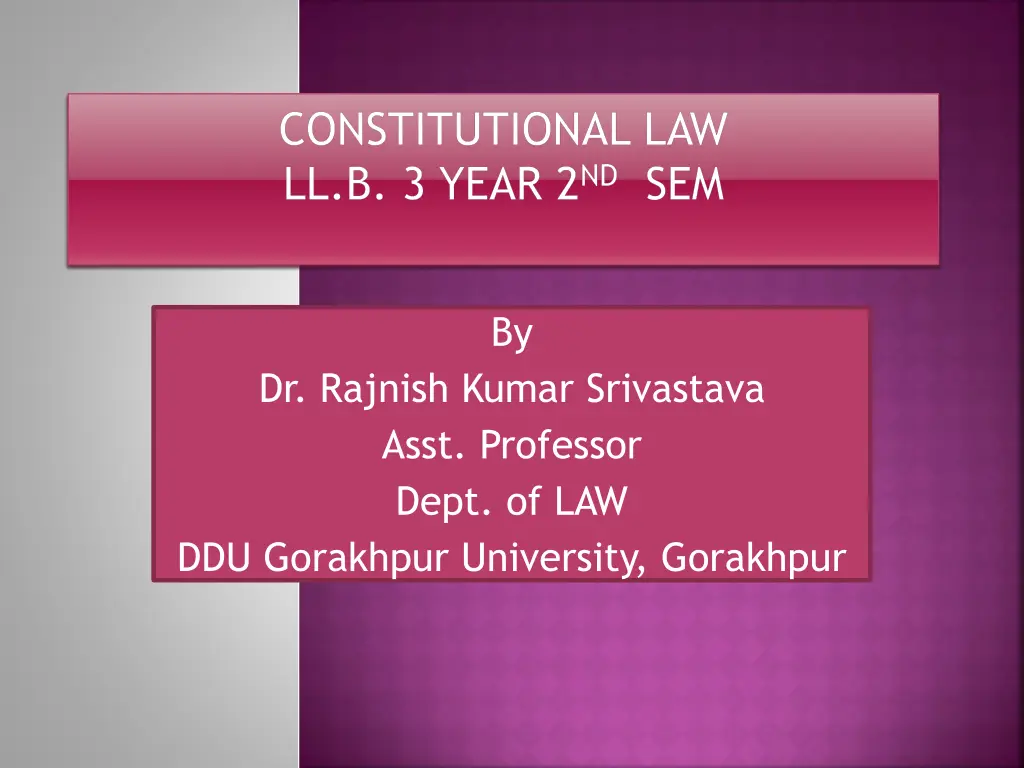
Understanding Constitutional Law LL.B. 3 Year 2nd Sem: Prohibition of Discrimination Against Citizens
Explore the intricacies of Article 15 in Constitutional Law LL.B. 3 Year 2nd Sem, focusing on the prohibition of discrimination against citizens based on religion, race, caste, sex, or place of birth. This analysis delves into the essential elements of Article 15(1) and key judicial interpretations to provide a comprehensive understanding of non-discrimination principles in India.
Download Presentation

Please find below an Image/Link to download the presentation.
The content on the website is provided AS IS for your information and personal use only. It may not be sold, licensed, or shared on other websites without obtaining consent from the author. If you encounter any issues during the download, it is possible that the publisher has removed the file from their server.
You are allowed to download the files provided on this website for personal or commercial use, subject to the condition that they are used lawfully. All files are the property of their respective owners.
The content on the website is provided AS IS for your information and personal use only. It may not be sold, licensed, or shared on other websites without obtaining consent from the author.
E N D
Presentation Transcript
CONSTITUTIONAL LAW LL.B. 3 YEAR 2NDSEM By Dr. Rajnish Kumar Srivastava Asst. Professor Dept. of LAW DDU Gorakhpur University, Gorakhpur
PROHIBITION OF DISCRIMINATION AGAINST CITIZENS Article 15 titled as prohibition of discrimination on grounds of religion, race, caste, sex or place of birth , contains provisions application of the general principle of equality of treatment embodied in article 14. of particular
IT MAY BE NOTED THAT- Article 15 secures the right against discrimination, only to citizens and for that non-citizens can not invoke the provisions of this article.
ARTICLE 15(1) The state shall not discriminate against any citizens on ground only of religion, race, caste, sex, place of birth or any of them.
ARTICLE 15(1) IS IN ABSOLUTE TERM Discrimination amongst citizens on ground of religion, race, caste, sex or place of birth or any of them by the state is prohibited under article 15(1).
THE ESSENTIAL ELEMENT OF ARTICLE 15(1) ARE- 1- Prohibition is on the state not to discriminate. 2- Right is given to citizens. 3- This right is guaranteed against discrimination in matters of rights, privileges and immunities pertaining to a citizen.
CASE OF KATHI RANING RAWAT AIR 1952 SC 123 The Supreme Court said that this article the important word is ONLY , if the discrimination is based on some connected with caste, sex or place of birth but some other rational factor, the discrimination would be valid. in grounds religion, not race,
D.P. JOSHI V. STATE OF MADHYA PRADESH AIR 1955 SC 334 In this case a rule framed for admission to the State Medical Colleges, required the payment of capitation fee from non- Madhya Pradesh students. The students of Madhya Pradesh were exempted for the payment. The discriminated on residence was upheld by the Supreme Court, as not violative of article 15(1). Court said that Place of birth is different from Residence . rule ground which the of
NO DISCRIMINATION AS TO USE OR ACCESS TO PUBLIC PLACES ARTICLE 15(2) Clause (2) of article 15 is a particular application of the against discrimination embodied in clause (1). While, clause discrimination against matters, clause (2) deals only with cases of discrimination as regards to the use or access to public places mentioned in article. general principle (1) forbids in citizens all
ELEMENTS OF ARTICLE 15(2) Article 15 (2) contains prohibition of a general nature and is not confined to state only. Accordingly, the essential features of article 15(2) may be pointed out as follows: citizens shall not be subjected to A- disability, B- liability, C- restriction, or D- condition, with regard to access to shops, public restaurants, hotels and places of public entertainments, and use of wells, tanks, bathing ghats, roads and place of public resort.
THE PLACE DEFINED IN THE ARTICLE, ARE- 1- maintained wholly or partly out of state funds, or 2- dedicated to the use of the general public. it follows that a private tank, well or a bathing ghat, does not come within the purview of article 15(2)(b).
PEOPLES UNION FOR DEMOCRATIC RIGHTS V. UNION OF INDIA AIR 1982 SC 1473 The fundamental right, which was enforceable against private individuals was being violated, it would be the constitutional obligation of the State, to take necessary steps, for the purpose of interdicting such violation and ensuring fundamental rights by the private individual who was transgressing the same. Supreme Court ruled that whenever any observance of the
THANKS Dr. Rajnish Kumar Srivastava
